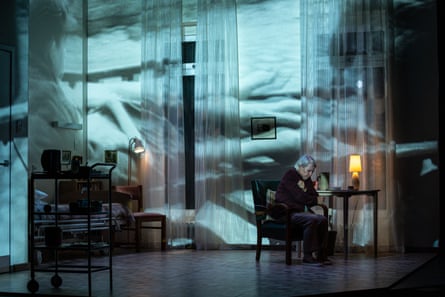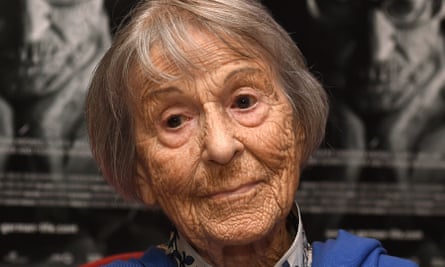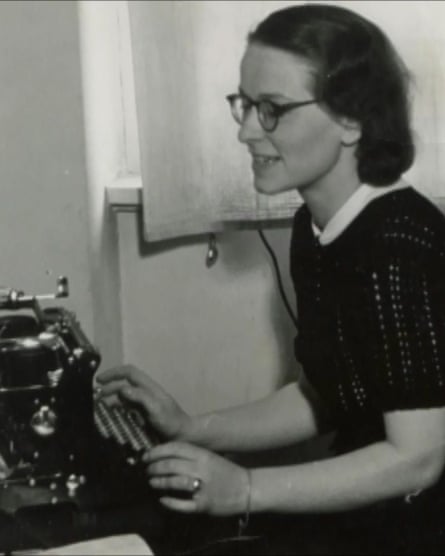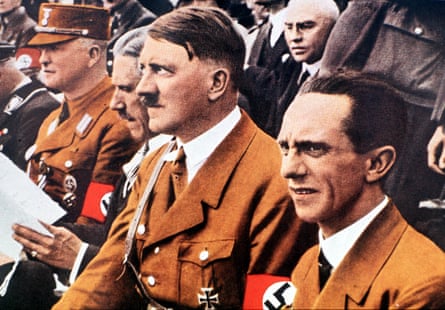Confronting, unsettlingly ambiguous, a powerful source of self-reflection – Sir Christopher Hampton’s one-woman play A German Life caused a stir when it premiered in London in 2019, marking Maggie Smith’s return to the stage after a 12-year absence.
Neil Armfield’s production, now playing at the Adelaide festival with Robyn Nevin in the role of Joseph Goebbels’ secretary, is garnering a similar response.
Claiming political naivety, Brunhilde Pomsel swore until her death in 2017 at the age of 106 that she never knew about the concentration camps while she worked for Hitler’s minister for propaganda throughout the second world war.
Hampton’s play, based on about 30 hours of transcripts from documentary-makers who interviewed Pomsel in 2016, is set in Pomsel’s austere room in an aged care facility, from which she recounts – almost matter-of-factly – her presumption that both a Jewish girlfriend and a former gay male colleague who disappeared had simple been “relocated”. She remembers with pride how she confidentially processed the paperwork that signed the death warrant for anti-Nazi student activist Sophie Scholl, executed for high treason in February 1943. She justifies her decision to sign up as a member of the Nazi party, on the grounds it was purely a savvy career move, securing a plum job with a fat pay cheque under Nazi Germany’s supreme propaganda puppeteer – a boss she describes as impeccably groomed and “damned good-looking”.

In the play, moments approaching anything remotely resembling remorse are fleeting. Pomsel spent the five years after the end of the war incarcerated in Buchenwald concentration camp under the Russians. It was only upon her release in the early 1950s, she says, that she learnt that an estimated 56,000 Jews, political prisoners and prisoners of war had perished there during the Nazi regime.
“We didn’t want to know about them, we really didn’t,” she says at one point, the closest she gets to acknowledging that her apolitical ignorance might not cover all the moral bases.
And there appears to be a lingering incomprehension when she recounts the horror of the moment she was informed that Joseph and Magda Goebbels had just murdered all six of their children before committing suicide in the Führerbunker she had shared with the family – “polite children … they would curtsy and shake our hands”.

Hampton is a playwright and screenwriter, best known for his play Les Liaisons Dangereuses and the Academy award-winning 1988 film version Dangerous Liaisons – along with the 2007 film adaptation of Ian McEwan’s novel Atonement.
When he first came across Pomsel’s story, in the 2016 Austrian documentary of the same name as his play, Hampton was not inspired by her claims that she had no inkling of Hitler’s true agenda; that she was just a typist with killer shorthand, doing her job.
A friend of his had recommended the documentary, knowing Hampton’s fascination with 1930s Germany and believing there could be a play in it.

“I suppose I’m a little obsessed with Germany in the 1930s, but I watched the film and couldn’t actually see [a play] at all,” he tells Guardian Australia.
“The film is in black and white, it’s very aesthetically organised, she’s lit very beautifully … But when she was saying, ‘I knew nothing about it [the Nazi atrocities]’, I sat there thinking, ‘well, I don’t believe that for a minute’.
“I didn’t understand what play I could write.”
Hampton graduated with a first-class degree in German and French at New College, Oxford, in the late 1960s. He has adapted Ödön von Horváth’s book Youth Without God, examining the plight of anti-Nazism in a classroom setting; and has also adapted a novella by German exile Stefan Zweig, who took his own life in 1942 due to the mounting Europe crisis, called Letter from an Unknown Woman.
But his curiosity in Pomsel was only piqued after he met one of the Austrian documentary-makers and was offered a copy of the full transcript – all 30 hours of it.
“Her personality just jumped off the page,” Hampton says. “I think in the documentary she was quite nervous, and the whole setup was quite formal … you get the feeling she’s just trotting out the old story.
“In the transcript she came across much livelier … she was sometimes quite amusing and she keeps coming back to certain, very clear moments in her life.
“Whenever she talks about the ‘Jewish problem’ or her Jewish friends … the grammar breaks up in a curious way, she’s stumbling and the sentences trail off.
“So at the end of 235 pages, I almost believed her. I almost believed that she didn’t know what was going on because she was so resolutely uninterested in anything except going to work, getting paid, going to the local restaurant with her friends, doing what she was told.
“I thought maybe I can write a play where the audience has to decide what she knew or didn’t know. And in making that decision maybe the audience starts thinking about themselves and what they would have done in those extraordinary circumstances.”

When the Guardian watched the play at the Adelaide festival, an audience member in the adjoining seat was visibly moved; she was the child of Holocaust survivors. The grainy black and white images of Nazi Germany projected onto the walls of Pomsel’s room at various intervals throughout – an element Armfield added, with Hampton’s blessing – were enduringly confronting for her. But how to interpret Pomsel’s – or possibly Nevin’s – emotional coldness? As a vindication of her claims she was just a naive secretary ? Or confirmation that here was a woman whose experiences had rendered from her soul any trace of a moral compass?
Hampton concedes that by the end of transcript he had developed “a sort of affection” for Pomsel. “In a way I think she was quite courageous. And she didn’t deny anything really except the main fact, the main problem of the story, which is, what did she know or didn’t know?”
Her story is complicated further by a part of Pomsel’s life Hampton stumbled on, which was not included in the transcript or the documentary. A casual chat with one of the film-makers revealed that the Goebbels secretary had an affair with a twice-married Jewish man, who subsequently fled to Amsterdam with his second wife. Pomsel conducted regular trips to liaise with Gottfried Kirchbach in the Netherlands, and was deeply in love. She fell pregnant and had an abortion at his insistence. Kirchbach died in 1942. Pomsel never married or had children.
“I just cling to the hope that the world doesn’t turn upside down again as it did then, though there have been some ghastly developments, haven’t there?” Pomsel told the Guardian in an interview in 2016, the year before she died.
“I’m relieved I never had any children that I have to worry about.”

One of the more intriguing observations Pomsel makes in the play A German Life is her reflection on contemporary society; in 2016, would people still be that naive in the face of a mortally wounded democracy?
“Nowadays, I don’t think people would be stupid enough to fall for the kind of nonsense we fell for,” she says in the play. “All that hot air, I don’t think you can get that past people anymore.”
Hampton is less optimistic. Her analysis, after all, was delivered less than a year before Donald Trump was elected.
“Bland acceptance of lying from politicians, it’s been a very conspicuous feature over the last 10 years,” he says. “Tell a lie big enough and keep repeating it, and people will eventually come to believe it.”
A German Life is running until Sunday 14 March at the Dunstan Playhouse, as part of the Adelaide festival
Kelly Burke travelled to Adelaide as a guest of the Adelaide festival

Comments (…)
Sign in or create your Guardian account to join the discussion